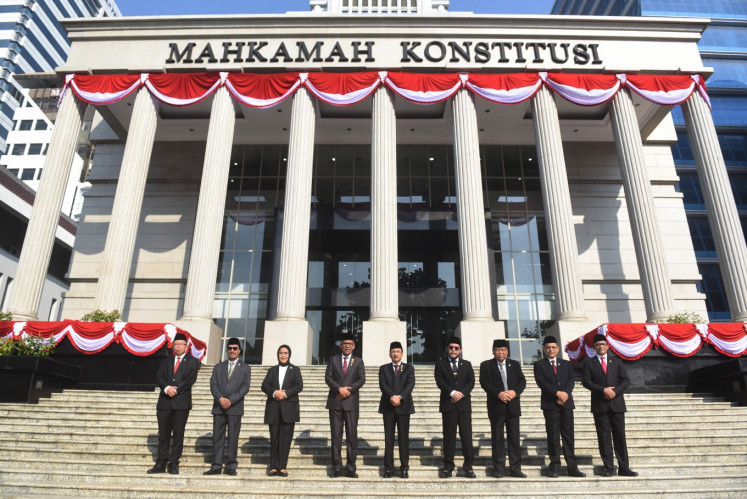Popular Reads
Top Results
Can't find what you're looking for?
View all search resultsPopular Reads
Top Results
Can't find what you're looking for?
View all search resultsUrban Chat: JFW? RTW... FTW!
Just in case youâre not too fluent in the text or fashion language, the above title means âJakarta Fashion Week? Ready-to-Wear⦠for the win!âAnd Iâve got every reason to shout it out from the top of my lungs and column
Change text size
Gift Premium Articles
to Anyone

J
ust in case you're not too fluent in the text or fashion language, the above title means 'Jakarta Fashion Week? Ready-to-Wear'¦ for the win!'
And I've got every reason to shout it out from the top of my lungs and column. Having been fortunate to observe closely the Jakarta Fashion Week (JFW) for years, I was very pleased for finally see the blossoming of ready-to-wear collections during the sixth JFW before it ended last weekend. There was a fresh crop of designers and their promising ready-to-wear line.
For the longest time most new designers aspired to design haute couture. And I don't blame them'the lure from bygone couture giants such as Alaïa, Balmain, Dior, Halston or Madame Gres is quite irresistible.
They designed with grand visions and delivered in such detailed, refined craftsmanship that the attires often took a life on their own beyond the initial wearers, treasured for generations and fiercely hunted for in vintage boutiques.
Couture had a long fabulous run while it lasted, but times have changed into a much faster pace. Few nowadays are willing to go to three fittings within three months for something that costs an arm and a leg and probably worn only thrice.
People still want to look great, but they need it this p.m. for something they just learned about this a.m. Today evening gowns and suits can be found off-the-rack, with day-to-night fashion tips very popular on magazines.
Princess Grace might've donned head-to-toe Hermès and philanthropist Nan Kempner wore Bill Blass for lunch, but Kate Middleton constantly appears in jeans. The current state of couture business in Paris indicates that while it won't die thanks to VVIP clientele, ready-to-wear (RTW) in wider price ranges clearly has a more sustainable future.
In Indonesia, with rising middle class gulping down new lifestyle choices, RTW offers a much larger potential market for designers to build a base on ' which is critical, before expanding into international markets.
I'm glad that most up-and-go designers at the latest JFW seemed to have grasped and embraced that knowledge. Whether sleek or opulent, affordable or pricey, most of the collections labeled as RTW were indeed suitable for that segment.
What's next after parading on or winning awards in JFW? Indonesian designers rarely have creativity problem. What they've often had is difficulty in turning the creativity into a viable business in the long run.
Many designers let imaginations run wild without even grasping the notion of target market, thus ending up not selling much. The ones who are lucky to corner a market often lack the ability to maintain standard collections following the retail calendars ' much to the disappointment of store buyers and end customers.
Kudos to JFW and IFW (Indonesia Fashion Week), who have started to address this acute problem lately. Tapping into the vast network of British Council, JFW has been bringing fashion business experts to provide creative and business counsels to emerging designers.
The results have started to show this year, as the Buyers' Room, facilitated by the Trade Ministry, started to resemble a professional place where designers were able to articulate their vision, assign pricing, and present the collection in a look-book.
One big challenge that remains is that international trade shows are often conducted about a month after the big four fashion weeks (New York, London, Milan, Paris) finish, pretty much the same time JFW is held.
Buyers not ordering due to creative or business considerations is one thing. Buyers not arriving in droves due to conflicting schedules is entirely another issue.
Another interesting decision JFW took this year was partnering up with the country's largest state-owned bank known to have supported handcrafters for years.
Thumbs up for the initiative to directly pair up designers to crafters in a parade of collections that beautifully showed how Indonesian traditional fabrics could be worn as RTW pieces beyond ceremonial costumes.
Yet, as wonderful as the idea to support different emerging designers year after year, I wonder if there's a hand-in-hand strategy coaching or financial backups ' necessary building blocks for any start-up ' provided for the discovered designers long enough for them to gain sure footing in a market, domestic or international.
It sounds sexy for any sponsor, or government for that matter, to say that they've sponsored a dozens of new designers every year. Yet it will be more groundbreaking to be able to make a dozen of Indonesian designer international household names, say, in a decade or less.
Industrial game-changers at most; real-impact CSR efforts at best.
Now, on a lighter tone, my personal JFW picks, specifically from RTW perspective.
Most interesting to watch in coming years: Toton Januar, Peggy Hartanto and Milcah. Jenahara, Nur Zahra (Muslim fashion). Rosalyn Citta (accessories).
Setting comfortably in their direction: Monday to Sunday, Alex(a)lexa, Misan, Lenny Agustin.
Future forces to reckon with: Isis, Ardistia, Auguste Kraton, Hian Tjan, Billy Tjong.
Fierce fashion foot forward for the win, folks!
Lynda Ibrahim is a Jakarta-based writer and consultant with a penchant for purple, pussycats and pop culture.









